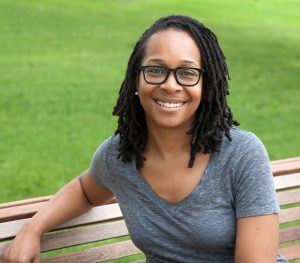
Editor’s Note: NDG has had the pleasure of working with Ms. Watkins in the past and we are delighted to see her on-going success!
UT Dallas alumna and author LaToya Watkins BA’06, MA’11, PhD’15 recently joined the ranks of writers including Alice Walker, Thornton Wilder and James Baldwin as a fellow in The MacDowell Colony.
Watkins, who received her doctoral degree in aesthetic studies, took note of the selective program while attending a writer’s conference in 2014.
“I thought it was a pretty long shot for me when I looked at some of the people who had been here,” Watkins said.
She was referring to the more than 60 Pulitzer Prize winners who have participated in the artists’ colony in Peterborough, New Hampshire. The program has awarded fellowships to more than 7,000 artists and writers, among them Leonard Bernstein, Jonathan Franzen and Alice Sebold.
Founded in 1907 by Marian MacDowell, pianist and wife of American composer Edward MacDowell, the colony is set on a farm and includes 32 studios. In 1997, the program was awarded the National Medal of Arts for “nurturing and inspiring many of this century’s finest artists.”
“The mission of The MacDowell Colony is to nurture the arts by offering creative individuals of the highest talent an inspiring environment in which they can produce enduring works of the imagination,” reads the program’s mission statement. “The sole criterion for acceptance to The MacDowell Colony is artistic excellence.”
Watkins was awarded the fellowship in 2015, and she headed to New England this year, from May 16 to June 2, focusing her energy on her current writing projects.
During her time at the colony, Watkins found a wellspring of productivity. She submitted the first draft of her first novel, as well as the first half of her second book.
“This experience is quite different for me,” she said. “I have found it to be a positive experience, and I kind of get sad when I think about coming out from this place, re-entering into the world and how I’m going to handle that and still take some of these lessons with me.”
Watkins said that while residents have communal spaces to eat breakfast and dinner, most of her days were spent working in her studio deep in the woods.
“It took me some days to get used to it,” she said. “Writing is all there is to do. There’s no internet or phone connection on most of the property. For most of the day, you are completely disconnected from the world. There’s even a pretty big space around you and the other colonists.”
With a family at home, including three teenagers, Watkins said she felt guilty at first to be unplugged from her close-knit group and the demands that come with it.
“I found the isolation liberating,” she said. “I was able to produce writing that wasn’t influenced by my roles here. I could go off of life experiences that weren’t always connected to me as a mother, teacher, wife or daughter.”
Watkins said the experience of strong women remains her favored subject matter. In 2014, she received the Pushcart Prize for her short story “The Mother,” which explored the black matriarchal experience in West Texas.
“I’m intrigued by women who are the bearers of history and those who shape history through their memories and their words,” she said. “Women as mothers and what they teach their children and how they choose to mother has always been something I’m drawn to.”
She credits her experience in the creative writing program at UT Dallas, and specifically her mentorship under program director Dr. Clay Reynolds, as instrumental in building her confidence as an author.
She has published a dozen short stories. Last December, she released her latest, “The Peeling,” which she wrote in one of her writing workshops at UT Dallas.
“The stories she tells are her stories, and she knows how to tell them in a way that is both true to them, true to her characters and true to herself,” Reynolds said. “In doing so, she reaches all of us and makes us think and, most important, feel. The result is writing that exceeds the bounds of the moment and connects us all in the commonality of experience. I have no doubt that her name will very soon grace the pages of the national media and she will find herself standing firmly in the ranks of the country’s great writers.”




